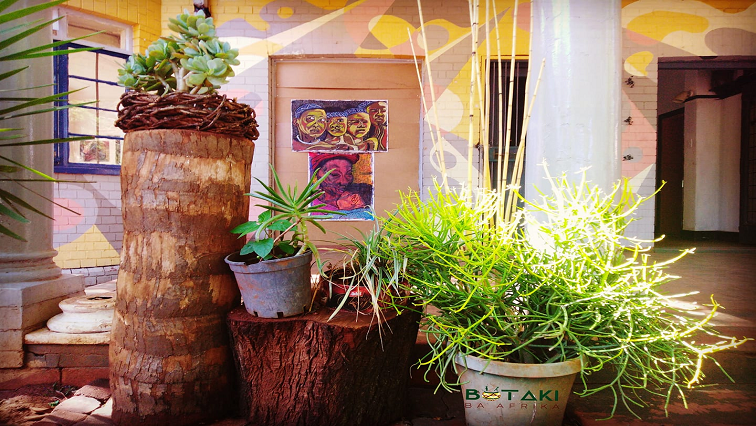After identifying an abandoned house in Hatfield, Pretoria and following all legal guidelines, five young artists occupied the house and turned it into a community art centre that assists disadvantage artists. Their non-profit organisation is called Botaki Ba Afrika, Tswana for the Craft or Art of Africa. As part of their monthly programme, they host a jazz event in the capital city. They believe jazz is an important art form and a communication methodology that deserves greater recognition.
The large living room stretches to a carpet which is used as a makeshift stage. There’s a single microphone, a drum set, speakers and a keyboard. The audience sits on small pillows for comfort to mitigate the hard wooden floor.
On stage, jazz artists enchant the audience who are now totally ensconced in the room. They are hooked to the chords, melodies and rhythms of jazz. It’s rare to find young people on a weekend evening packed in an old double storey building, listening to jazz. That’s the style of Botaki Ba Afrika.
Thabang Rabotapi, one of the co-founders of this non-profit organisation, says that the organisation represents African art.
“African Art, so basically what Botaki Ba Afrika represents is all about art, African artistic arts…Basically what we focusing on is developing young artists from townships, artists that need a platform, artists that need development, artists that do not have equipment or material to compose their work or create their work. So basically we are out there giving them a business opportunity and their platform to showcase their art. So yeah, that’s the main objective.”
Using what they call Art Therapy, they also use the process of making art as a channel to escape the plague of youth delinquency and substance abuse. The house, which is becoming accustomed to playing host to regular jazz events, is a double storey building, with fading yellow paint. However, Rabotapi says in 2016 it was an abandoned drug den.
“So basically this house was an abandoned space. It was occupied by a lot of drug addicts, heroin takers, your Nyaope takers, whatever it may be. They used to occupy this space, to make it their drug house. So then, myself and a group of artists, friends, colleagues, we identified this spot and then we went to go and do the research and enquire about whose house it is. It was the South African government’s house. They agreed and we got our opportunity.”
Two years ago, Botaki Ba Afrika faced its toughest test. In a freezing winter morning they had unexpected visitors. A year after the young artists occupied the house, rumours that they were peddling drugs flared up, the place was raided by police.
“It was 10 June 2017, a raid pulled through. They came through, they trashed our things outside. They got misinformed about whose house this was. There was a lot of politics. I believe that the University of Pretoria was behind it. A lot of people were behind it. They got the wrong information about this house, they didn’t know, but what’s nice is that they asked for forgiveness. But they didn’t take any further action on assisting us about the things that we lost, but that year it was a tragedy.”
With determination and collective will, the young artists eventually recovered from the lingering suspicion of drug peddling.
“We comforted one another when this thing happened. Even when this thing happened, they all pulled through. Yeah it was a group of artists who pulled through and supported one another going forward; looking back in the past it only made us stronger. That’s why we are still here today.”
The jazz event was part of Botaki Ba Afrika’ s integration programme consisting of various musical themes, including, modern jazz, neo soul and ethnic and indigenous sounds. It’s called ‘Funk The Movement’. Mpho Tshwalwe from Mamelodi east of Pretoria, is a jazz pianist and is the creative brain behind ‘Funk The Movement’. Collaborating with Botaki Ba AfriKa, this initiative, he says, aims to generate more interest and support from music lovers.
“Many clubs are closing, many clubs that we aspire to play at are closing. Many jazz cats are dying without any recognition. We want to keep the torch of jazz burning into the future.”
Another person who believes the torch of jazz will shine brighter is Goddess, who was the emcee of the event. She is also a jazz producer and presenter.
“I don’t think when it comes to jazz, we are underrated. I think we are growing, and it’s important to look at it from a positive perspective. The fact that we are here as young people to a music that might be regarded as music for old people, it says something. Jazz may not be where we want it to be, but it’s getting there. I’m seeing it now. How many young artists do we have here in Pretoria? A lot.”
Botaki Ba Afrika is an arts hub that attracts young creative minds, who sometimes need an escape from the solitude of creating art, to interact with like-minded individuals. Bolepu Mathabatha says in Botaki Ba Afrika, he has found such a place.
“Firstly good music, because this is one of the places, where you get to enjoy that music with taste, because there’s a lot of venues where they only play house but there’s few places where you can get jazz music. So I’m here for jazz.”
There’s also Keneilwe Chuena, who is another young co-founder of Botaki Ba AfriKa. Walking in the gate of Botaki Ba Afrika, one is welcomed by her generous smile and warm energy. This can easily be attributed to her passion for Yoga. But’s it’s also her passion for jazz and building their Botaki Ba Afrika brand.
“Tickets like Fill Up the Dome are instead of those from the State Theatre, where the Malombos is playing. So it shows us where our people are drawn to. But it’s spaces like Botaki Ba Afrika that give us hope to continue creating so that people relearn, because we not really exposed to it. Jazz is not really played on TV and radio as much as your turn up songs and your vibey songs.”
Botaki Ba Afrika represents the resilience of young creative brains, eager to fulfil their dreams while landing a helping hand to others. It also displays tenacity. In a society where the arts industry guarantees no financial rewards, these young artists are tenacious in their quest to do what they love.






